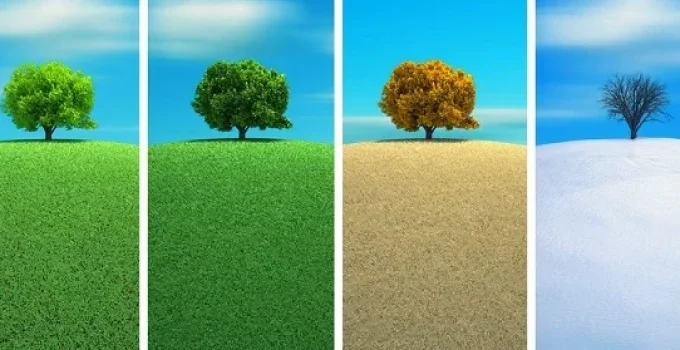Does Venus Have Seasons?
No, Venus does not have seasons like Earth does. While our planet goes through spring, summer, fall, and winter because it’s tilted on its axis, Venus has almost no tilt at all. That means its weather stays nearly the same all year round—extremely hot, dense, and stormy.
Let’s explore why Venus is so different from Earth when it comes to seasons, weather, and planetary motion.
🔎 Dive Deeper
- 🌍 What Causes Seasons on Earth?
- 🪐 Venus Has Almost No Tilt
- 🌡️ The Climate of Venus
- 🌬️ Weather vs. Seasons
- 🎯 Final Thoughts
- 📚 References
🌍 What Causes Seasons on Earth?
To understand why Venus doesn’t have seasons, let’s first look at why Earth does.
- Earth is tilted 23.5 degrees on its axis.
- As it orbits the Sun, different parts of the planet get more or less sunlight.
- This change causes seasonal temperature shifts throughout the year.
| 🌎 Example | When the Northern Hemisphere tilts toward the Sun, it’s summer there. Six months later, it’s winter. |
Because of Earth’s tilt, the Sun appears higher or lower in the sky at different times of year, changing the amount of daylight and heat we receive.
🪐 Venus Has Almost No Tilt
Venus is very different. Its axial tilt is only about 3 degrees—almost perfectly straight up and down.
| Planet | Axial Tilt |
|---|---|
| Earth | 23.5° |
| Venus | 3° |
| Mars | 25° |
| Uranus | 98° |
This tiny tilt means Venus doesn’t experience strong differences in sunlight during its orbit. Every region gets about the same amount of sunlight all year long, so no seasons form.
🌀 Even more strange, Venus rotates backward, which means the Sun rises in the west and sets in the east!
🌡️ The Climate of Venus
If Venus had seasons, we might notice changes in temperature or weather. But that’s not the case.
Venus has the most stable climate of all the rocky planets—but it’s also the most extreme:
- Surface temperature stays around 860°F (460°C) day and night, year-round.
- No part of the planet gets colder—not even the poles.
- No significant change in sunlight occurs throughout the Venusian year.
☁️ This consistency is mostly due to its thick carbon dioxide atmosphere, which traps heat in all directions. This process is called the runaway greenhouse effect.
| 🔥 Fun Fact | Even though Venus takes 225 Earth days to orbit the Sun, its temperature barely changes at all during that time. |
🌬️ Weather vs. Seasons
While Venus doesn’t have seasons, that doesn’t mean it’s completely still.
There is weather on Venus—it’s just not seasonal:
- Super-fast winds circle the planet at over 200 mph (about 320 km/h).
- Clouds of sulfuric acid swirl through the atmosphere.
- These winds stay fast all the time, not just in part of the year.
🛰️ Satellites have watched giant spinning storms form over Venus’s poles. But again, these aren’t tied to seasons—they’re driven by the atmosphere’s strange behavior.
| 🌪️ Fact | Venus’s upper atmosphere spins faster than the planet itself—a phenomenon called super-rotation. |
🎯 Final Thoughts
So, does Venus have seasons? The answer is no. Unlike Earth, Venus has almost no tilt, which means it gets even sunlight all year long. Its thick, toxic atmosphere traps heat, keeping the whole planet at a scorching, steady temperature no matter where or when you look.
Even though it doesn’t have seasons, Venus is still full of wild weather and mysteries. Understanding why it’s so different from Earth helps scientists learn how planets evolve—and what makes Earth so special.
📚 References
- NASA Solar System Exploration. “Venus Overview.” https://solarsystem.nasa.gov/planets/venus/overview
- European Space Agency (ESA). “Venus Express: Seasons and Climate.” https://www.esa.int
- The Planetary Society. “Venus: The Hottest Planet.” https://www.planetary.org/space-missions/venus
- Space.com. “Why Doesn’t Venus Have Seasons?” https://www.space.com/venus-no-seasons.html
- National Geographic Kids. “Planet Venus Facts.” https://kids.nationalgeographic.com
